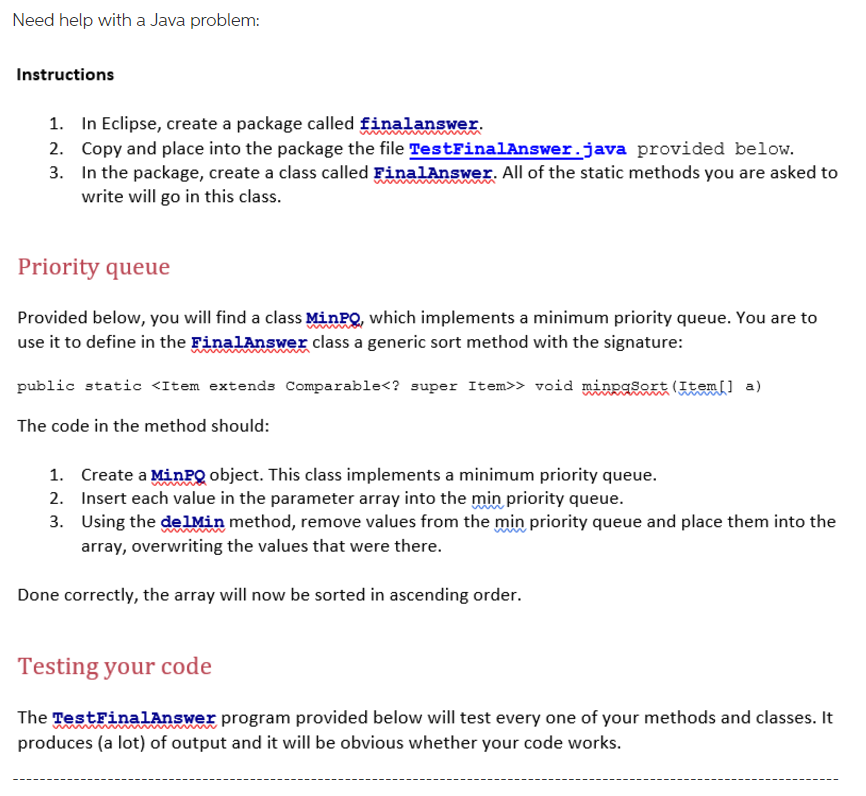Question
MinPQ.java: import stdlib.*; import java.util.Comparator; import java.util.Iterator; import java.util.NoSuchElementException; public class MinPQ > implements Iterable { private K[] pq; // store items at indices 1

MinPQ.java:
import stdlib.*;
import java.util.Comparator;
import java.util.Iterator;
import java.util.NoSuchElementException;
public class MinPQ
private K[] pq; // store items at indices 1 to N
private int N; // number of items on priority queue
private Comparator super K> comparator; // optional comparator
// helper function to double the size of the heap array
@SuppressWarnings("unchecked")
private void resize(int capacity) {
if (capacity
K[] temp = (K[]) new Comparable[capacity];
for (int i = 1; i
pq = temp;
}
@SuppressWarnings("unchecked")
/** Create an empty priority queue with the given initial capacity, using the given comparator. */
public MinPQ(int initCapacity, Comparator super K> comparator) {
pq = (K[]) new Comparable[initCapacity + 1];
N = 0;
this.comparator = comparator;
}
/** Create an empty priority queue with the given initial capacity. */
public MinPQ(int initCapacity) { this(initCapacity, null); }
/** Create an empty priority queue using the given comparator. */
public MinPQ(Comparator super K> comparator) { this(1, comparator); }
/** Create an empty priority queue. */
public MinPQ() { this(1, null); }
/**
* Create a priority queue with the given items.
* Takes time proportional to the number of items using sink-based heap construction.
*/
public MinPQ(K[] keys) {
this(keys.length, null);
N = keys.length;
for (int i = 0; i
pq[i+1] = keys[i];
for (int k = N/2; k >= 1; k--)
sink(k);
//assert isMinHeap();
}
/** Is the priority queue empty? */
public boolean isEmpty() { return N == 0; }
/** Return the number of items on the priority queue. */
public int size() { return N; }
/**
* Return the smallest key on the priority queue.
* @throws java.util.NoSuchElementException if the priority queue is empty.
*/
public K min() {
if (isEmpty()) throw new NoSuchElementException("Priority queue underflow");
return pq[1];
}
/** Add a new key to the priority queue. */
public void insert(K x) {
// double size of array if necessary
if (N >= pq.length - 1) resize(2 * pq.length);
// add x, and percolate it up to maintain heap invariant
pq[++N] = x;
swim(N);
//assert isMinHeap();
}
/**
* Delete and return the smallest key on the priority queue.
* @throws java.util.NoSuchElementException if the priority queue is empty.
*/
public K delMin() {
if (isEmpty()) throw new NoSuchElementException("Priority queue underflow");
exch(1, N);
K min = pq[N--];
sink(1);
pq[N+1] = null; // avoid loitering and help with garbage collection
if ((N > 0) && (N == (pq.length - 1) / 4)) resize(pq.length / 2);
//assert isMinHeap();
return min;
}
/* *********************************************************************
* Helper functions to restore the heap invariant.
**********************************************************************/
private void swim(int k) {
while (k > 1 && greater(k/2, k)) {
exch(k, k/2);
k = k/2;
}
}
private void sink(int k) {
while (2*k
int j = 2*k;
if (j
if (!greater(k, j)) break;
exch(k, j);
k = j;
}
}
/* *********************************************************************
* Helper functions for compares and swaps.
**********************************************************************/
private boolean greater(int i, int j) {
if (comparator == null) {
return pq[i].compareTo(pq[j]) > 0;
}
else {
return comparator.compare(pq[i], pq[j]) > 0;
}
}
private void exch(int i, int j) {
K swap = pq[i];
pq[i] = pq[j];
pq[j] = swap;
}
// is pq[1..N] a min heap?
private boolean isMinHeap() {
return isMinHeap(1);
}
// is subtree of pq[1..N] rooted at k a min heap?
private boolean isMinHeap(int k) {
if (k > N) return true;
int left = 2*k, right = 2*k + 1;
if (left
if (right
return isMinHeap(left) && isMinHeap(right);
}
/* *********************************************************************
* Iterator
**********************************************************************/
/**
* Return an iterator that iterates over all of the keys on the priority queue
* in ascending order.
*
* The iterator doesn't implement remove() since it's optional.
*/
public Iterator
private class HeapIterator implements Iterator
// create a new pq
private MinPQ
// add all items to copy of heap
// takes linear time since already in heap order so no keys move
public HeapIterator() {
if (comparator == null) copy = new MinPQ
else copy = new MinPQ
for (int i = 1; i
copy.insert(pq[i]);
}
public boolean hasNext() { return !copy.isEmpty(); }
public void remove() { throw new UnsupportedOperationException(); }
public K next() {
if (!hasNext()) throw new NoSuchElementException();
return copy.delMin();
}
}
void showHeap() {
for (int i = 1; i
StdOut.print (pq[i] + " ");
StdOut.println ();
}
/**
* A test client.
*/
public static void main(String[] args) {
MinPQ
StdIn.fromString ("10 20 30 40 50 - - - 05 25 35 - - - 70 80 05 - - - - ");
while (!StdIn.isEmpty()) {
StdOut.print ("pq: "); pq.showHeap();
String item = StdIn.readString();
if (item.equals("-")) StdOut.println("min: " + pq.delMin());
else pq.insert(item);
GraphvizBuilder.binaryHeapToFile (pq.pq, pq.N);
}
StdOut.println("(" + pq.size() + " left on pq)");
}
}
TestFinalAnswer.java:
package finalanswer;
import java.util.ArrayList;
import java.util.Arrays;
import java.util.Random;
import stdlib.StdIn;
import stdlib.StdOut;
public class TestFinalAnswer {
public static
for (int i = 0; i
if (a[i].compareTo(a[i+1]) > 0) return false;
}
return true;
}
public static void main(String[] args) {
StdOut.println("*** " + FinalAnswer.yourName() + " ***");
StdOut.println();
Integer[] array = new Integer[12];
Random r = new Random();
for (int i = 0; i
array[i] = r.nextInt(1000);
}
StdOut.println("Array before sorting: " + Arrays.toString(array));
FinalAnswer.minpqSort(array);
StdOut.println("Array after sorting: " + Arrays.toString(array));
StdOut.println("Array is sorted: " + isSorted(array));
StdOut.println();
Queue
queue.enqueue("first");
queue.enqueue("second");
queue.enqueue("third");
queue.enqueue("fourth");
StdOut.println("Queue before reversing: " + queue);
FinalAnswer.reverseQueue(queue);
StdOut.println("Queue after reversing: " + queue);
StdOut.println();
double[] frequencies = {110.0, 110.0*1.224, 110.0*1.224*1.224};
ArrayList
for (Chord risingChord: risingChords) {
StdOut.println("Playing: " + risingChord);
risingChord.play();
}
StdOut.println();
ArrayList
StdIn.fromFile("data/CTAdata.txt");
while (!StdIn.isEmpty()) {
int runNumber = StdIn.readInt();
String lineColor = StdIn.readString();
String nextStation = StdIn.readString();
String arrivalTime = StdIn.readString();
ctaTrains.add(new CTATrain(runNumber, lineColor, nextStation, arrivalTime));
}
StdOut.println("--- Trains before sorting ---");
for (CTATrain ctaTrain: ctaTrains) {
StdOut.println(ctaTrain);
}
StdOut.println();
ctaTrains.sort(null);
StdOut.println("--- Trains after sorting by run number ---");
for (CTATrain ctaTrain: ctaTrains) {
StdOut.println(ctaTrain);
}
StdOut.println();
ctaTrains.sort((CTATrain t1, CTATrain t2) -> (t1.getArrivalTime().compareTo(t2.getArrivalTime())));
StdOut.println("--- Trains after sorting by arrival time ---");
for (CTATrain ctaTrain: ctaTrains) {
StdOut.println(ctaTrain);
}
StdOut.println();
StdOut.println("=== " + FinalAnswer.yourName() + " ===");
}
}
Need help with a Java problem: Instructions 1. In Eclipse, create a package called finalanswer. 2. Copy and place into the package the file TestFinalAnswer.iava provided below. 3. In the package, create a class called FinalAnswer. All of the static methods you are asked to write will go in this class. Priority queue Provided below, you will find a class MinPO, which implements a minimum priority queue. You are to use it to define in the EinalAnswer class a generic sort method with the signature: public staticStep by Step Solution
There are 3 Steps involved in it
Step: 1

Get Instant Access to Expert-Tailored Solutions
See step-by-step solutions with expert insights and AI powered tools for academic success
Step: 2

Step: 3

Ace Your Homework with AI
Get the answers you need in no time with our AI-driven, step-by-step assistance
Get Started


